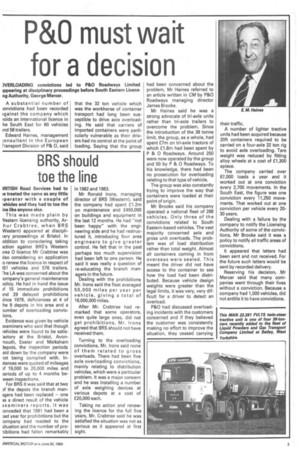BRS should toe the line
Page 5

If you've noticed an error in this article please click here to report it so we can fix it.
IRITISH Road Services had to le treated the same as any little Iperator with a couple of *hides and they had to toe the ine like anyone else.
This was made plain by Vestern licensing authority, Arh u r Crabtree, when BRS Western) appeared at disciplitary proceedings at Bristol. In iddition to considering taking iction against BRS's Western irea 0 licence Mr Crabtree was ilso considering an application o renew the licence in respect of l51 vehicles and 576 trailers. The LA was concerned about the :ompany's general maintenance )olicy. He had in hand the issue )f 15 immediate prohibitions Ind 29 delayed prohibitions ;ince 1979, deficiences at 4 of he 9 depots in his area and a lumber of overloading convicions.
Evidence was given by vehicle ?xaminers who said that though vehicles were found to be satisactory at the Bristol, Avonnouth, Exeter and Melksham lepots, the inspection periods aid down by the company were lot being complied with. Initances were quoted of mileages af 19,000 to 20,000 miles and aeriods of up to 4 months beween inspections.
For BRS it was said that at two A the depots the branch manegers had been replaced — one es a direct result of the vehicle examiners reports. It was :onceded that 1981 had been a lad year for prohibitions but the :ompany had reacted to the iituation and the number of prolibitions had fallen remarkably in 1982 and 1983.
Mr Ronald Irons, managing director of BRS (Western), said the company had spent £1.2m on maintenance and £450,000 on buildings and equipment in the last 12 months. He had "not been happy" with the engineering side and he had restructured it, introducing four area engineers to give greater control. He felt that in the past perhaps too much supervision had been left to one person. He said it was really a question of re-educating the branch managers in the future.
Dealing with the prohibitions Mr. Irons said the fleet averaged 50,0 0 0 miles per year per vehicle, giving a total of 16,000,000 miles.
After Mr. Crabtree had remarked that some operators, even quite large ones, did not get prohibitions, Mr. Irons agreed that BRS should not have received them.
Turning to the overloading convictions, Mr. Irons said none of them related to gross overloads. There had been five axle overloading convictions, mainly relating to distribution vehicles, which were a particular problem. It was a major concern and he was installing a number of axle weighing devices at various depots at a cost of £20,000 each.
Taking no action and renewing the licence for the full five years, Mr. Crabtree said he was satisfied the situation was not as serious as it appeared at first sight.






















































































